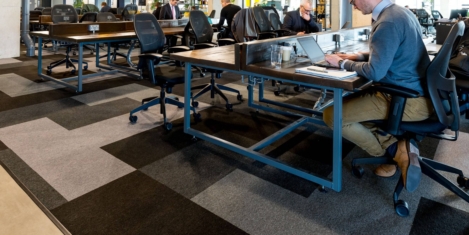July 11, 2018
Katrina Kostic Samen confirmed as President of the British Council for Offices
 The British Council for Offices (BCO) today welcomes Katrina Kostic Samen as its new President. Katrina Kostic Samen, Founder and Managing Partner at KKS Strategy, formally takes over the position from Ken Shuttleworth, Founding Partner of Make Architects, at the BCO’s Annual General Meeting in London today, Wednesday 11th July. As Chair of the BCO Annual Conference held earlier this year in Berlin, Katrina set out the vision for her Presidential year, challenging delegates to look at the workplace from multiple occupier perspectives, and to ensure that they are designing and delivering offices which are inclusive and provide for a diverse workforce.
The British Council for Offices (BCO) today welcomes Katrina Kostic Samen as its new President. Katrina Kostic Samen, Founder and Managing Partner at KKS Strategy, formally takes over the position from Ken Shuttleworth, Founding Partner of Make Architects, at the BCO’s Annual General Meeting in London today, Wednesday 11th July. As Chair of the BCO Annual Conference held earlier this year in Berlin, Katrina set out the vision for her Presidential year, challenging delegates to look at the workplace from multiple occupier perspectives, and to ensure that they are designing and delivering offices which are inclusive and provide for a diverse workforce.















 Built environment organisations are calling for urgent action on issues such as consumption, innovation and infrastructure to prevent the UK slipping behind other nations on poverty, equality and the environment as a new report released today (3 July 2018) highlights the UK’s inadequate performance against the United Nations Sustainable Development Goals (SDGs), including those for the built environment. The report, Measuring up, from the UK Stakeholders for Sustainable Development (UKSSD), is the first comprehensive assessment of the UK’s performance against all 17 SDGs and highlights a significant danger that quality of life in the UK will worsen if action is not taken. Just some of the findings of the report include; that the UK is performing well (green) on only 24 percent of its targets; no industry, innovation and infrastructure targets have achieved a ‘good’ performance rating, with gaps in policy coverage and inadequate or deteriorating performance and large scale, sustained investment in replacing ageing infrastructure and creating additional resilient and low carbon infrastructure of all kinds is required.
Built environment organisations are calling for urgent action on issues such as consumption, innovation and infrastructure to prevent the UK slipping behind other nations on poverty, equality and the environment as a new report released today (3 July 2018) highlights the UK’s inadequate performance against the United Nations Sustainable Development Goals (SDGs), including those for the built environment. The report, Measuring up, from the UK Stakeholders for Sustainable Development (UKSSD), is the first comprehensive assessment of the UK’s performance against all 17 SDGs and highlights a significant danger that quality of life in the UK will worsen if action is not taken. Just some of the findings of the report include; that the UK is performing well (green) on only 24 percent of its targets; no industry, innovation and infrastructure targets have achieved a ‘good’ performance rating, with gaps in policy coverage and inadequate or deteriorating performance and large scale, sustained investment in replacing ageing infrastructure and creating additional resilient and low carbon infrastructure of all kinds is required.






 A major research study “
A major research study “








June 28, 2018
Ten demonstrable truths about the workplace you may not know
by Kerstin Sailer • Comment, Facilities management, Features, Workplace design
(more…)